#like i get that it easily symbolizes the themes
Text
Gothic fiction is when there is an old mansion, that's it
#this is a joke#like i get that it easily symbolizes the themes#lack of control uncertainty decay feeling powerless#what better place than a big rotting house where you kight not be familiar with the rooms/layout#*might#it's also a LOT of the books I can think of#gothic#the death of jane lawrence#mexican gothic#the little stranger#la hacienda#jane eyre#northanger abbey#the haunting of hill house#we have always lived in the castle#the yellow wallpaper#i feel like i'm still probably forgetting some house gothics
461 notes
·
View notes
Text
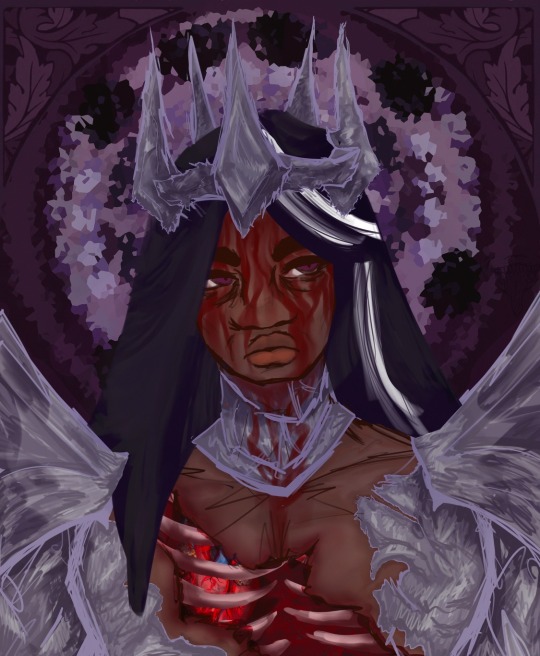
How much pain can you forgive?
What would you do for those you swore to protect?
#something something an eye for an eye but the actual physical scarring can be interpreted as symbolism of Dark Cacao and Choco's characters#bcs Choco's is like on his eye a very defining and public scar like it's one of the first things you see on his character which can be#interpreted as like how it's clear as day that he's not the same “noble prince” he was while Dark Cacao's (possible) scar is not only#never seen in any of his sprites but we never get a scope to how bad the injury was (even though it's possible he was hardly injured due to#like being immortal but I digress and also think that interpretation is incorrect) could be seen as how he hides his damage from the kingdo#and its citizens even though it's eating him up from the inside and eventually spills over into a more physical manifestation (the wall) of#his grief and all that he DOES try his best to hide how much everyone he ever cared about leaving him affects him.#anyway tl;dr Dark Choco's damage from their conflict is incredibly visible which is reflected in his eye scar while you wouldn't be able to#see Dark Cacao's as easily or at all. Anyway you get it. You see the themes. The symbolism.#tw gore#cw gore#Is this body horror????#probably not????#I heard somewhere that Dark Cacao's crown was supposed to look like thorns and y'know who ELSE#I'm not a christian but sometimes their symbols and stuff go hard tbh#its called like stigmata or smthing (just about the blood on his face)#crk#teethart#cookie run fanart#dark cacao cookie#dark cacao crk#cookie run kingdom#fanart#my art#artists on tumblr#digital art
26 notes
·
View notes
Text
NEW FANTASTIC CHAPTER Sit back and let's talk about it together
This is a fantastic chapter for a number of reasons so I'll make several posts
1. Yoshida is the stupid one
Yoshida intended to manipulate Denji by putting him in a dilemma: either he stops being Chainsaw Man, or Nayuta will die.
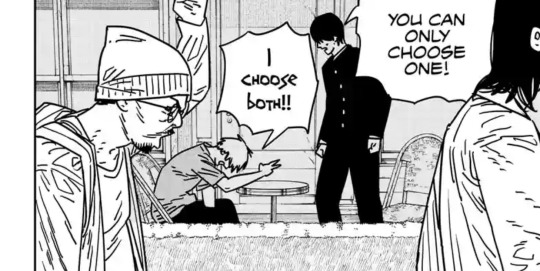
When Denji says he wants both choices, he is scorned by Yoshida who, like their first meeting, thought he could easily manipulate him. So much so that he had planned his own response: Denji would resign himself and choose Nayuta for sure. But the one in the weakest position is Yoshida: he is the one who made the mistake and Denji did not give in.
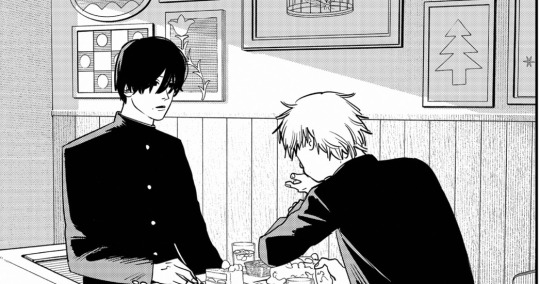
What Fujimoto is indicating, in my opinion, is that not only will Yoshida never be Makima, but that he has no intention whatsoever of setting up a character who would be analogous to her
Makima's plans were meticulous, to the point where she anticipated the attacks that would target her
Yoshida isn't capable of this, but neither is public safety in Makima in general.
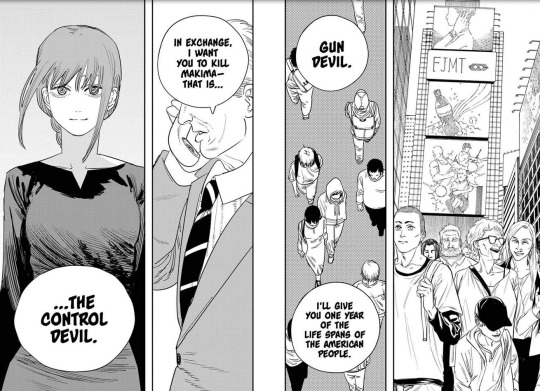
Denji is no longer the product of a system
I talked about this more broadly once before, but one of the themes of CSM is the system, and more broadly a critique of the world of work and capitalism. Fears are exploited, contracts are necessary and unbalanced, and only a sad and cold end awaits each of the public safety hunters.
The fact that Denji is calling for both choices is not a matter of stupidity, or of a capricious and childish reaction
This demand is a conscious choice not to belong to the system
More broadly, it is the conclusion of Denji's development as he reclaims his own identity: Chainsaw man
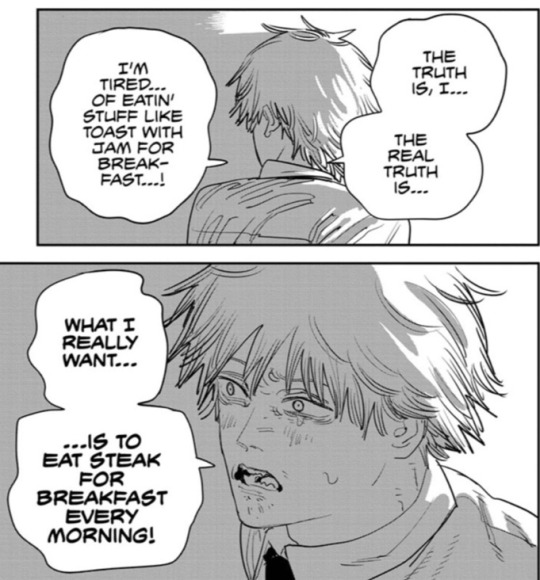

He can't be a mere human because he never was, having gone from a dehumanised child, a tool, to a heroic and demonic figure with no intermediary.
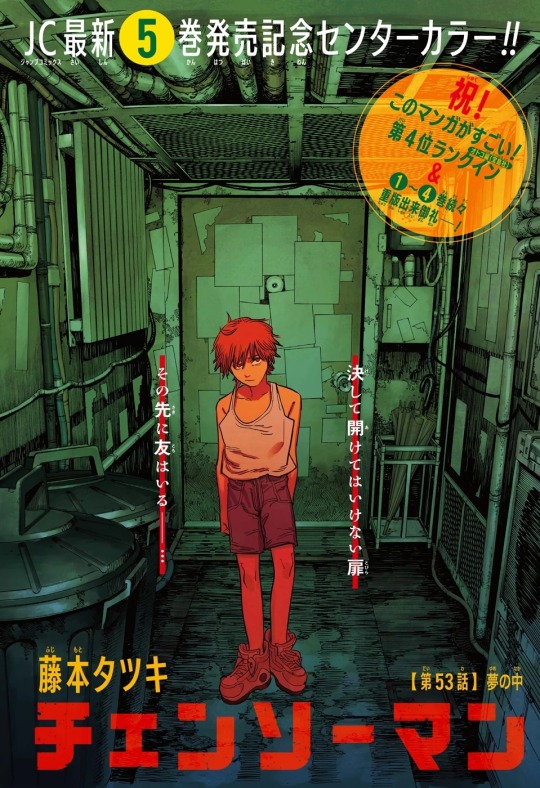

It was Makima who exploited Denji's dream of the bare minimum, of normality.
And it was the fact that he wanted something bigger that allowed him to fight her
Because he no longer respected the rules of the game that she herself had defined
"Obey or die", in other words, the paradigm that Denji had to fit into when he arrived is over
No one will give him this ultimatum
The two fingers have always been Denji's symbol
Firstly, the mistake of confusing peace with "don't worry, it'll be a piece of cake", a phrase he used when he was ready to face anything for Makima.
Then, Denji used it again when Power died a second time for him, showing that he'd be ready to keep on fighting.
"Don't worry it’ll be a piece of cake" now showed Denji's willingness to get out of Makima's system
It'll be as easy to fight for her as against her
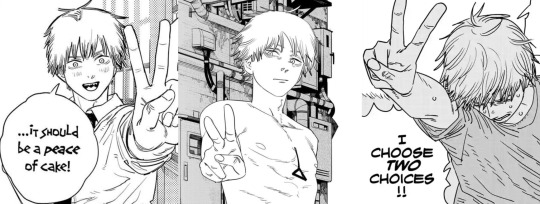
From now on, this symbol would transcend everything and symbolize his identity, freed from any form of system or oppression: two choices, two identities, one human and the other demonic in the same package.
Chainsaw Man

If you're not tired and want to know why Chainsaw Man has to go…
The second part of this analysis is right here:
2K notes
·
View notes
Text
Hunter is probably going to die this season.
You know I’ve theorized this if you’ve been following me since Season 1. As the season keeps rolling out, the more and more I really do think this will happen.
We know that the ending will be bittersweet, and we know that the emotions behind the ending has a lot to do with fatherhood in particular (according to DBB)
They are putting a huge emphasis on Crosshair and Omega’s relationship. Particularly how he could fill a paternal role for her. Omega mirroring Crosshair is a huge sign to not only us as the audience, but to Hunter as well, that Crosshair can (and will) become a father figure to her. They didn’t have to show us that Hunter noticed Omega mimicking Crosshair. But they did. They’re masterfully crafting that something is going on in Hunter’s head. He’s thinking about Crosshair and Omega’s relationship, and what that could mean.
Crosshair still has a long way to go in regards to his guilt. They could easily have him sacrifice himself at the end to ultimately quell all of his guilt, but I believe that they’re going the route of subverting everyone’s expectations. Crosshair could sacrifice himself for full redemption (like they do with most Star Wars characters) and he probably would given the chance. But story wise, he doesn’t really need to.
If they were planning to go that route, he wouldn’t have been reintroduced to and accepted by the group so early on in the season.
They are actively showing Crosshair paving the way to his redemption. He’s putting in the work. He is protective, helpful, and actively putting himself in danger for the benefit of his family. He’s redeeming himself already. Him dying isn’t necessary to resolve his story. In fact, I think it would diminish the power behind his change. People can make bad decisions. They can hurt others. They can change. And they can live to see happier days. That is hope. And that is always the overarching theme of Star Wars.
Hunter, on the other hand, has been incredibly uncertain and indecisive throughout the entire show. Where Crosshair knows and acts on his decisions, whether good or bad, Hunter has been unsure of himself and his role in everything. His path is way less cut and dry. It almost feels like, in many ways, he has lost his leadership. And he feels it. He regrets his decisions. He probably blames himself for everything bad that has happened. He clearly doesn’t fully trust himself to keep his family safe.
How can his story be resolved, short of him simply finally deciding to take a stand and fight for the other clones?
By giving up his life for his family, for a cause he never wanted to be a part of, as a leader should. So they can go on and live the life he so desperately wants for them.
I don’t think at this point in the story Hunter would allow anyone else to sacrifice themselves. He would stop it from happening. He��s learned from his mistakes.
My theory is that we will see more and more instances of Hunter recognizing Omega’s growing relationships with others, especially Crosshair. And when the time finally comes, he’ll be able to let go of needing to be her primary protector. He’ll see the growth in her, and in his brothers, and finally trust that they’ll be okay. Whether he sacrifices himself or gets mortally injured in a fight/accident, he will be at peace.
I don’t know if his death will be ambiguous or unseen, like him dying in an explosion or something like that, or if it will be more obvious.
I could see him having a Fives-esque death. Where he can say goodbye to his family, and finally pass off the responsibility he held so close to his heart to Crosshair and his brothers.
And if Tech really is dead, he won’t have to be alone anymore.
They’d put Hunter’s helmet above his grave, the last real symbol of the Bad Batch, and a last goodbye to the Clone Wars (since his helmet resembles the regs’ helmets the most)
They’d leave Tech’s goggles on his grave (if Tech stays dead) along with Lula. Omega would leave a bouquet of flowers from Pabu. What a powerful image that would be.
Omega could then go on to lead her own little batch. She’s made the friends and connections to do so. Crosshair and the others wouldn’t be too far behind.
It would be a touching resolution to Hunter’s and Crosshair’s and Omega’s arcs.
Other clues I think they’re dropping that support this theory:
-Omega’s new hair design. It’s perfect for her to wear Hunter’s bandana.
-Batcher joining the squad. She fills the tracking role.
-Crosshair’s increased screen time with Omega.
-Hunter’s increased desire to do whatever it takes to keep Omega safe, and the hints that he becomes reckless upon doing so.
-The Marauder exploding. Something about losing the home and the head of the home making for great storytelling.
-The idea of passing the torch of leadership to the next generation. From Clone Wars (TBB) to the new SW content (Omega)
-The fact that Jen Corbett said Hunter is her favorite character, and I’ve never known a female writer who doesn’t whump the hell out of their favorites the most (fr one of the most compelling arguments lol)
#the bad batch#star wars#clone wars#sw tbb#tbb#star wars tbb#hunter the bad batch#crosshair the bad batch#the bad batch spoilers#omega the bad batch#tbb theories
262 notes
·
View notes
Text
Another example of Eddie's potential role in Welcome home
First of all: SUPER excited for the Barn Makeship plush!! I gotta save up for it really soon
But second of all: I can't help but point out that even in the advertisement, the theme of Eddie being "unwanted" or only there as the butt of the joke is still present
Now there have been instances (especially after the new update) of Eddie being snubbed/dismissed/isolated, here are a few good posts getting into some specific instances (and what it can mean) and we can see that in the new Makeship video too:

When Howdy is trying to explain how the plush can help "Keep your home safe from even the PESKIEST of UNWANTED guests!", who is the example that he uses here? Eddie.
Pretty harsh words to direct towards somebody just trying to do his job, right? Might even make a fella feel less like a welcomed neighbor than ever...
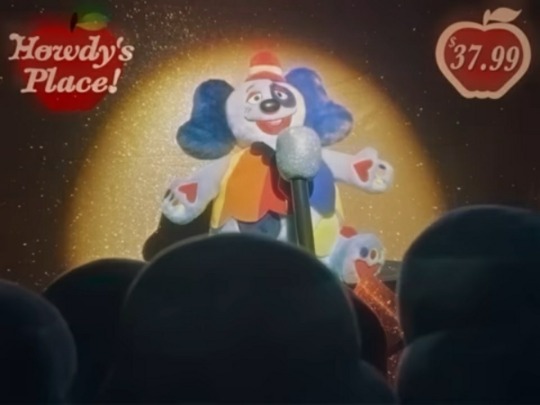
And as Barnaby is getting into his stand up routine, he mentions how he hadn't seen that many lemons (talking about the Wallys, very cute actually) ever since he had "chased Eddie up the lemon tree!"
Which seems a bit more of a rude thing to do to someone rather than funny. Poor Eddie was probably trying to not get hurt again
Not that the audience is really concerned though- they still readily laugh at it
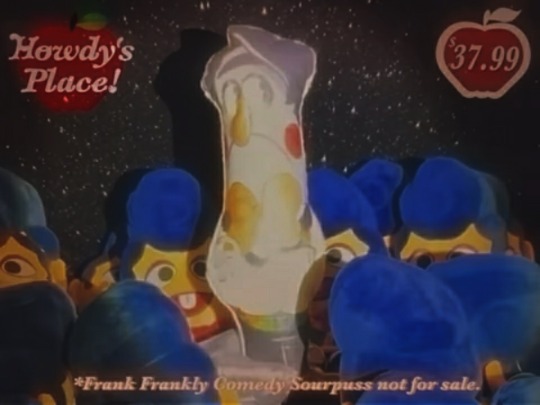
The only person really tried to somewhat stand up for Eddie was Frank, (which might hint at them being more involved with each other than the others know (heck ye protect ur man)).
But the problem with that is that he's literally being labelled as a "Comedy Sourpuss™️", both here, and probably other instances. So while Frank might be giving a legitimate criticism of it not being funny (likely because it was at Eddie's expense), that itself can be easily be dismissed as him being only that. A Sourpuss that doesn't get Comedy and is just trying to ruin the fun for everyone else
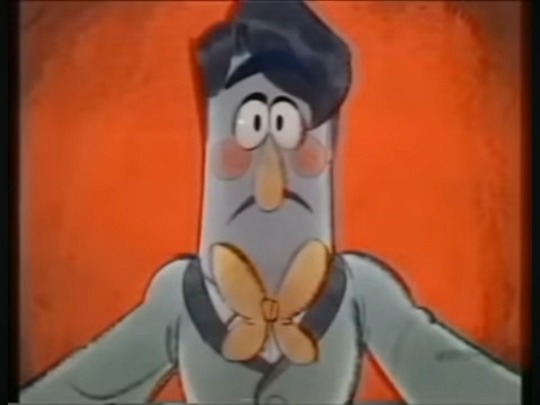
It's certainly tough to say at this stage, but I have a hunch that as the story continues on, we might run into an instance of Frank trying to protect Eddie from this treatment in some way (here's a post I saw that gets into that a lil bit via the gelatin and pea dish symbolism).
However, I think he won't be successful in doing so, as the other neighbors (and on a greater scale - the show and its producers themselves) are just as easily ready to dismiss his arguments as him being "too uptight" rather than that of a legitimate concern, leading them to continue on

And while in usual circumstances it would be relatively fine for a show to have a character purely dedicated to being the butt of the joke, it might not so fun when that character has possibly become AWARE of being just a character for a tv show, because they might soon realize that they were only written/designed/wanted as the butt of the joke for that tv show, and nothing more.
This all to say - Eddie is really going through it right now, and there might not really be a way for anyone to help him out, even if they wanted to.
Who knows how and if he can continue to handle all that?
....
(tl:dr - The new Makeship video shows more instances of Eddie being labeled as unwanted/only useful as the butt of the joke, which might be a running theme/future conflict for him as a character in the WH story. If so, it will be difficult for him to escape that predetermined role in the show, which would put him in even more turmoil)
....
But anyways, thank you for reading yet another unwarranted, overanalyzing ramble based on like three new lines✨
#welcome home#welcome home arg#welcome home spoilers#eddie dear#frank frankly#howdy pillar#barnaby b beagle#welcome home update#analysis
351 notes
·
View notes
Text
The plush under Collector's bed: A totally necessary analysis, trust me
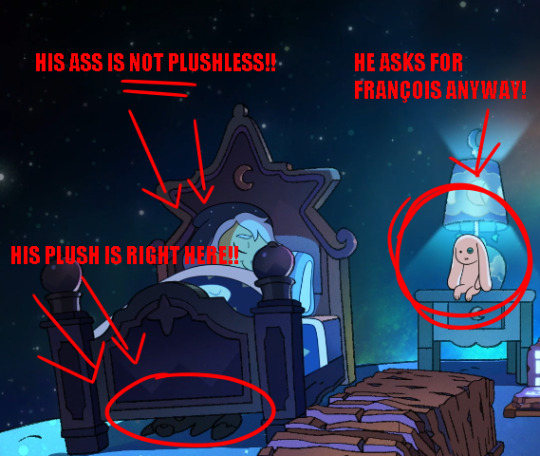
So, as a recap of this scene, before King leaves to visit Eda and Lilith, Collector asks King if he could sleep with François that night.
King reminds Collector that only himself and Luz can hold François, and Collector obliges but asks that he at least leave François there to "watch over him", claiming he "doesn't like being alone".
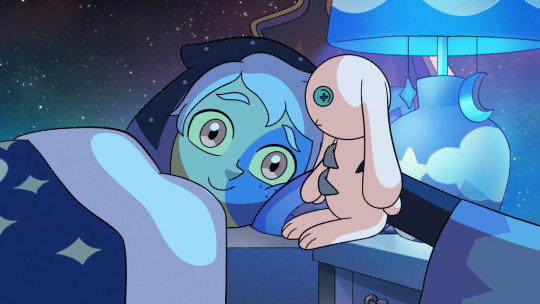
King does so, and Collector seems satisfied. It's very telling of Collector's development that they never touch François after this interaction, showing respect for King's boundaries.
... Except! This sweet little angel is actually a master trickster! A liar and a fiend!
He had a plush under his bed the whole time!!! In fact I'm pretty sure every shot of their little bedroom planet has the underside of Collector's bed obscured UNTIL King starts to leave and we pan to see the beds from an angle which reveals the plush!
You know what this means, right? Collector could have easily pulled his plush from under his bed and cuddled up with that if he hated sleeping alone so much, but he didn't. Why?
Well, I don't think he was lying about being lonely. Loneliness seems to be a prominent common theme for Collector, both declaring his loneliness back at the start of O' Titan, during a vulnerable moment where he didn't expect anyone to hear him, so he'd have no reason to lie there...
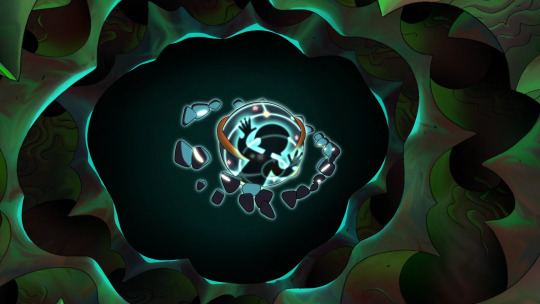
And then also having this acknowledged by King in the current episode, who has been living with him for about two months now, so he would know Collector's state of mind better than most here.

So... what gives? Was Collector really only out to force King to give François to him? Why?
Well, my current theory about this is what François means in this scenario: a connection to King. We know François is very important to King and King does not hide this when he expresses to Collector how he won't let them hold him.
To Collector, being able to sleep with François is the ultimate foolproof way to ensure King won't leave them. First, if King eventually lets them hold him, it signifies King would trust them enough with this and hold them to a regard as high as Luz, which we know Collector seems to be jealous of. I... just realized I should probably analyze that too, huh. Well, all in its due time.
And second, even if King won't allow them to hold François, but leaves them close to Collector in their room, that already acts as a guarantee. A guarantee that King will come back for François eventually, that King won't leave them to sleep alone the entire night.
Whatever the case, François is a symbol, a meter to test their closeness for Collector and King, and considering how many times Collector has lost people they considered friends before (whether those were real friends - in the case of the titan babies - or not - in the other collectors and Belos' case -) and have been double crossed by Belos, it's no wonder they have trust issues and want to make sure King does care about keeping them company.
So... that's it, then? He probably threw his original plush under the bed and then lied to King he lost it and is now constantly trying to get King to let him either hold François or at least keep him close to him as a connection between him and King?
Well... yeah, but if you'd allow me, I'd also like to talk a little on the symbology of the plush here. You see, while we can't make out the full of what the plush looks like, it appears to be some sort of canine with pointed ears and a poofy tail. Maybe it could be a titan, even a plush replica of King, but... I don't think so. There seems to be no stitching around the neck to signify it has a skull like titans do.
See, I think this is a fox plush. And why it is important in a metatextual sense that it is a fox requires a look into lots of different possibilities, each enriching the narrative in a different way.
For one, in popular folklore, foxes are seen as tricksters, lying and cheating their way into what's most convenient for them. Villain or hero, the fox is always winning people over through tricks.

This would align with the very nature of the plush being thrown under Collector's bed: it calls back to the fact he's tricking King with this. And yes, while Collector does have his problem with "fibbers", I don't think he's above more harmless tricks, we've seen him joke around with King before, purposefully feigning ignorance to mess with him, and the very nature of how he splattered Belos was through him lying that he wasn't mad. He may dislike it when a major lie is told, but little lies and sarcasm are no stranger to him.
Another possible connotation is the fact that rabbits and foxes are naturally prey and predator. François is a rabbit, Collector's plush is a fox. King, the member of the species that was hunted by the collectors, holds the prey animal, while Collector holds the predator animal...

The position of the plushes is also important here if we go with this interpretation: François is on top of King's bed, indicating he does not conceal he is the prey here and is well aware of this. He says so as much: "this whole time I was scared of making him mad". In general he behaves like a scared animal around Collector, despite their efforts to put them in equal grounds and the fact they have spent so long together and made considerable progress in their friendship.
Collector's fox on the other hand is under their bed, signifying Collector has concealed their fox, or maybe more appropriately, buried and left the fox behind. They may be part of the species that wiped out all the titans, the predators that so mercilessly hunted King's species as prey, but they want no part in this. Their backstory seems to involve wanting to play with titans and denouncing the other collectors after all, likely being bitter at them for ruining everything and hunting their new playmates to near extinction.
Alternative readings also include a few possible pop culture references. A possible one is the prominent role of the Fox in the Little Prince. While Hunter is the one who has been nicknamed "little prince" by Darius, Collector still seems more thematically similar to the character, being a child who came from space:
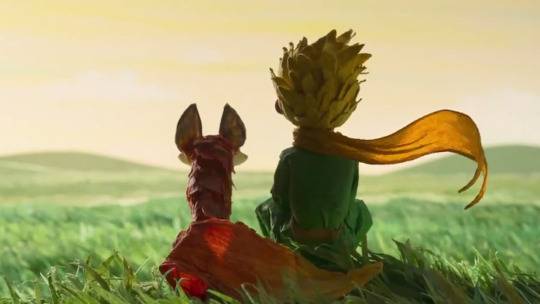
The similarity also hands itself to the fact King does somewhat resemble a fox with his canine qualities and fluffy tail, and in the story, the Fox was one of the first friends the Little Prince makes on Earth, and the one to teach him how to approach someone who does not trust you yet, to "tame" them.
Yet another possible reference this could be is the Disney movie "The Fox and the Hound":
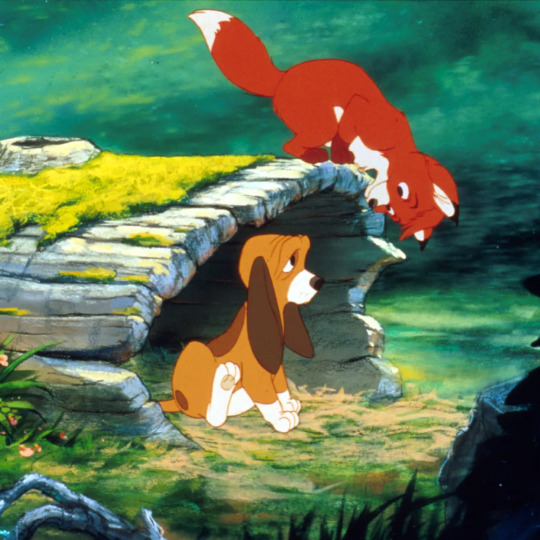
Which seems like something I should frankly make a whole separate post comparing the eerie similarities it harbors to the current dynamic Collector and King hold. But to summarize, if you don't know the movie, it follows a hunting dog pup and a fox pup that become friends at a young age, and their friendship must overcome advertisities unique to their species.
If this is a reference to this particular movie, this once again has a different reading: Collector is clearly the hunting dog here, not the fox. For him to keep a fox under his bed would signify he wants to keep King close to him, safe under his bed and protected. This could even be a call back to the very last scene the titular fox and hound in the movie share: Copper, the hound, positions himself above the fallen Todd, the fox, protecting him. The plush being under the bed to mirror this would make sense.

Whew! I think that's everything that I had in mind to comment on this particular tiny easter egg. Whatever meaning you take from this about Collector's mysterious plush, I hope I could at least inspire something in you!
#the owl house#the collector#toh collector#king clawthorne#toh theory#toh analysis#toh spoilers#Commander's orders
2K notes
·
View notes
Text
Devildom Wedding Headcanons
I realized you probably wouldn't get a Christian wedding in Hell.
cw: lotta alcohol, Satanic themes
Weddings in the Devildom are anything but a quiet affair. They're noisy, colorful, and caked in excess.
A demon world wedding ceremony could be mistaken for a nonstop reception. The guests are always on their feet, constantly on the move by dancing, swinging, hooting, howling, and jumping. Raucous revelry is seen as a sign of support for the pairing.
Demonus flows at all points of the ceremony, though not in high concentrations so most guests can partake throughout the whole event. Food is also served plentiful and easily portable so the dancing doesn't have to stop for snacks.
Wedding venues tend to be outdoors to accommodate the movement. Couples often choose town squares, forest clearings, or parks to hold their ceremonies. It will go on no matter what weather as magic can be used to keep things dry and temperate. Thunderstorms are actually signs of good fortune as the realm is seen as adding noise to the festivities.
The decor is often chaotic and colorful. Guests are encouraged to bring their own flowers, fruits, and paints to crush and throw as they're moving. There is no coordination between parties, so all sorts of petals, juices, and colors will be mixed together by the end.
Music is bright and energetic. Swing jazz is a popular choice as it often reflects the energy of the venue. Full bands can be brought out or bands of friends and family members can partake in keeping things lively.
Fire is a big part of the ceremony. Torches, braziers, and bonfires are used for illumination - themselves alight in fantastic, magical colors. More expensive ceremonies will even opt to use shadow magic to make words and images from the shadows of the dancers.
The couple being wed is expected to be barefoot throughout the event, no matter the venue. It symbolizes willingness to tred a dangerous path together. Outfits are selected jointly, often to match in some way, to further demonstrate the unity.
The couple arrives together and enters the venue at the same time, upon which they will take their place in the center of the festivities - often marked by a large bonfire/stone/effigy. The couple dances to the music as the guests link hands to form moving circles around them.
Glasses of demonus are eventually passed to the couple in the center. The pair take turns speaking individually to their partner and the crowd, making declarative statements about their love and future devotion to one another in a form reminiscent of a toast. The crowd is encouraged to cheer or heckle if statements seem inauthentic.
A guest of the couples' choosing then brings them a set of rings to place onto each other. Once the rings are secured, they are allowed to kiss, then drink from their glasses as demonus and paint is showered onto them like champagne.
The ceremony moves right along to the reception within seconds. The guests are allowed to rest, eat, stand, and converse among themselves and with the couple. Wedding games such as Drunk Lawn Darts or Hot Coal Races are played while guests intermittently give speeches and toasts.
The reception ends when guests are too exhausted/wasted to continue any further. The couple is allowed to leave at earliest convenience to consummate the final event if they so choose to, though it's poor manners to leave before speaking to all guests.
Jobs allow two days of time off for employees to recover from expected hangovers.
#obey me#obey me shall we date#shall-we-date-obey-me#obey me leviathan#obey me mammon#obey me satan#obey me asmodeus#obey me beelzebub#obey me belphegor#obey me lucifer#obey me headcanons#obey me hc#obey me solomon#obey me simeon#obey me diavolo#obey me barbatos#obey me mephistopheles#obey me raphael#obey me thirteen#tw: alchohol mention
2K notes
·
View notes
Note
Sorry if you’ve already answered this, I’m having trouble finding different posts in your blog.
I know a lot of your asks are more practical-related, but how do you suggest fully encapsulating the horror and tragedy of war in a (fantasy) battle scene? I really need that emotional and gory impact but it also to seem reasonably realistic.
My favourite references are Battle of the Bastards in GoT and scenes from Lord of the Rings.
Thanks!!
Martin and Tolkien are not two authors I’d ever expect to find together when discussing thematic and abstract concepts like the horrors of war in their writing. One of them is extremely deep, and the other is a puddle. Neither of them are particularly “realistic” but only one of them claims that pretense while drawing from real history. If you’re wanting horrors of war, you’re much better off moving away from Martin and taking a gander at the actual War of the Roses.
Let me explain.
Tolkien served as an officer during World War I. By sheer body count, The Great War was one of the most bloody and brutal wars in human history. As a point of reference, over a million soldiers died during the Battle of Somme. Perhaps as importantly, World War I killed the cultural concept of the Summer War. Before World War I, the British upper class viewed war as a game. War was an adventure, something young men did between reaching manhood and getting married. Watson from Sherlock Holmes is an excellent example of the end result for this particular outlook. They figured they’d go off, have some jolly good fun, get a few scars, and be back in a few weeks in time for tea. What they got was a meat grinder. Two of Tolkien’s close friends died during the war. He also lived through the bombings during World War II while working as a professor at Oxford, he experienced the devastating effects that war had on the civilian population first hand, and, likely, saw a few of his students die. Despite his hatred of allegory, the man was working through some shit in The Lord of the Rings.
If you’re interested in learning more about World War I or even about effectively demonstrating the horrors of war, I do recommend reading All Quiet on the Western Front. I read it once in high school (more years ago than I’d like to admit here) and, much like Elie Wiesel, it has stuck with me. It was also such an effective anti-war novel the Nazis banned it and it was one of the first books they publicly burnt, so you know it’s good.
Back to Tolkien.
What they don’t tell you about fantasy is that it’s real life, just with elves and dwarves and magic. The real world forms the foundation of fantasy and it’s the humanity of the emotional experience in war, the good and the bad, with both ends cranked all the way to eleven that really makes Tolkien’s work so impactful. LOTR is operatic by design, but what keeps the narrative from falling into melodrama is the core thematic message underneath the pageantry. One of the major themes is hope, which gets symbolized in light, and hope’s interplay with despair, symbolized in darkness. Not just a rosy view of it either, but the genuine struggle to keep the light burning against all the overwhelming reasons to give up or give in. Tolkien allows his characters to be corrupted and redeemed, their struggle with temptation before ultimately choosing the better path or failing and falling into darkness. He commits to the idea that hope can be restored in the unlikeliest of places.
Boromir’s death is, perhaps, one of the best examples of Tolkien’s philosophy in action. Boromir is a character we’re not sure of, he wants the one ring from the outset, he’s the only one advocating that it shouldn’t be destroyed. The hearts of men are easily corrupted. When he tries to take the ring from Frodo, he falls into his worst instincts and breaks the Fellowship. But then, against the overwhelming flood of Uruk-hai, Boromir tries to save Merry and Pippin. He fights wounded, shot again, and again, until he’s felled by twenty arrows and he fails. Yet, in his failure he restores Aragorn’s hope in his people, gives him a reason to fight for Gondor, and inspires the audience to believe in Man’s potential for greatness.
Tolkien could have left Boromir in the dark, but he didn’t. He could’ve given into cynicism, but he didn’t. In every adaptation, Boromir’s death never fails to get me bawling. Boromir is both good and bad, both dark and light, his best and worst instincts are driven by the same underlying, sympathetic reason—his desire to save his people and fulfill his duty to his father.
On the whole, I find Tolkien’s presentation of the human condition and war to be more compelling and realistic than Martin’s. Tolkien’s underlying themes have more in common with All Quiet on the Western Front, Saving Private Ryan, and HBO’s Band of Brothers. For all that his characters often feel larger than life (by design, he’s telling an epic) there’s always a grounding quality that allows the audience to connect with them. Whether we agree with Tolkien’s core thematic message or not, Tolkien genuinely has something to say about warfare and its effect, both on personal and world changing levels, and he communicates that message very well.
The irony about the “horrors of war” isn’t about the horrors of war. Thematically, the “horrors of war” is about who we choose to become in the face of them when trapped in the crucible. Do we rise to our best selves? Do we fall to our worst? When every illusion about who we believe we are is stripped away, what’s left? It’s an existential question, not a “realistic” one.
You can’t write about the horrors of war in fiction if you have nothing to say about war, humanity, and its effects. All you’ll end up with is gore for shock value. The world becomes hopelessly depressing, and, in the end, all the blood turns brown before it’s finally shat out.
Hi, Martin.
Don’t get me wrong, Martin is a very skilled writer. His prose is genuinely beautiful and his first book in ASOF, A Game of Thrones is actually a pretty decent deconstruction in the traditional fantasy narrative and a fairly realistic treatment of how events would go for the standard well-meaning fantasy protagonist. And that’s… the deepest we get.
Martin comes out of the 24/Joss Whedon death for shock value school of writing and the land of Iron Age comics that doesn’t have anything to really say beyond, “people suck.” Underneath it all is a level of cynicism in the human condition that would make Garth Ennis blush. The deaths are just shock value. There’s nothing more to it than that. Once you’ve acclimated to the gore, there’s nowhere else to go and nothing else to think about. Ironically, out of his contemporaries, Robert Jordan is better at giving both war and death in his narrative lasting effect, driving character growth, and real meaning.
Martin and Tolkien are opposite ends of the spectrum in their approach to war and their outlooks are utterly incompatible. One of them is a complete cynic and the other is facing himself honestly, openly, fearlessly, and without a smidgen of irony. (The true irony here is that the latter is the Englishman.) Following Martin’s blueprint won’t bring you to a Tolkien outcome. Tolkien’s genuine emotion is the subject of mockery in Martin’s world. Season 8 may’ve been clumsy and infuriating, but it was the natural end of Comic Book Iron Age cynicism. There are no good people, people with power can never be trusted, and all heroes, no matter how noble, reveal their true colors as villains in the end. As Christopher Nolan said, “You either die a hero or live long enough to become a villain.” This philosophical outlook may be sold as realistic but it’s really just Political Both Sidesism, Fantasy Edition.
The irony is that the real history Martin draws from, The War of the Roses, is simultaneously crueler, kinder, more noble, more horrific, more impactful, and ultimately more hopeful than Martin’s own work. And this was post the Hundred Years War and all the wars that preceded it.
I bring you, the Duality of Man.
If you want to write a realistic battle scene, start with real war. If you want to write about the horrors of war, start with real war. Pick a war, any war, and dig in. Reading the experiences of others is a way to gain insight into experiences you yourself don’t share and start to process the different philosophies born out of those experiences. The horror of war is a human one.
The most important lesson is that you won’t get there by focusing on the battle itself. To truly feel the impact, every character needs to be carefully built from the very beginning with a through line to every horrific event that happens to them. If you want to learn how to do that, then you need to go study every single war movie from good to bad (including the jingoistic rah-rah ones) like Apocalypse Now, Saving Private Ryan, Battle for Iwo Jima, etc, to really start internalizing the underlying storytelling structure and character design formula that makes those films tick. There’s no one better at portraying the horror and humanity of war than the war film industry. Part of what makes the best of these films really good is their willingness to allow their characters to be emotional and vulnerable. Which you won’t find in a lot of fantasy novels that run on machismo, but is the secret sauce that gives Tolkien his impact.
Having the confidence to allow your characters to struggle, be vulnerable, experience humiliating circumstances, and appear weak is an aspect of writing that a lot of men and women struggle with. Cynicism is a form of self-protection to keep those emotions away, to keep one from being emotionally invested, and is a means by which we protect ourselves from being hurt. We may portray cynicism as the more realistic reality but it’s just a cloak we hide behind. Martin’s approach to warfare is less realistic than Tolkien’s. Tolkien’s characters approach warfare with an eye toward protecting their civilians, safeguarding their future, or, in the case of his villains, focus on genocide. War for Tolkien is the eradication of civilization and the destruction of the future. Characters from experienced combatants to innocent civilians are willing to risk their lives for a world and for the people who matter to them. Martin has the Summer War. It’s there in the title, A Game of Thrones. An entertaining charade of musical chairs. And while all of his characters are chasing power, almost none of them have any sort of vision or goal for the future beyond the accumulation of more. In Martin’s world, the only way to truly win is not to play, but in the real world playing is the only way to create the world you want. Cynicism ends with no seats at the table and no means to change or save anything.
It’s funny because England during the War of the Roses had been in a state of near constant warfare for hundreds of years with their own domestic powers and France prior to the War of the Roses kicking off. The concept of a Summer War didn’t really exist for the medieval nobility. Much as we joke today about war being a game for medieval nobles due to their ransom protections, it really wasn’t. The peasantry was also much, much more dangerous en masse than they are in ASOF. They drove traveling monarchs to hide in monasteries plenty of times and, while that’s funny, it’s not actually a joke.
Now, picture Joffrey dragged off his horse in the middle of a riot and having his skull crushed by a local fishwife right before being trampled into a bloody, unrecognizable pulp by sharp hooves.
Or enjoying the Agincourt bathing route.
You’re welcome.
-Michi
This blog is supported through Patreon. Patrons get early access to new posts, and direct access to us through Discord. If you’d like to support us, please consider becoming a Patron.
1K notes
·
View notes
Text
The Many References in Teniwoha's Samsa
If you haven't read "The Metamorphosis" by Franz Kafka, the one thing you likely know about the short story is that in it a man turns into a bug. And this is enough to recognize the allusion of Samsa being named after the protagonist, Gregor Samsa, as well as the imagery of a dragging tail and onomatopoeia of "zuki".
However, there are several deeper layers to Teniwoha's symbolism of themes and references to "The Metamorphosis" that add a great level of cohesion with Immiscible Discord's story.
First, I would like to say that "The Metamorphosis" can be found as a free pdf online, and is a very good short story, so if you have the time and energy you should read it. This post will only be summarizing the themes that are referenced in Samsa and Immiscible Discord and will not include some of the other great commentaries Franz Kafka has. And of course, it will spoil the progression of the plot.
Also, all quoted lyrics are from Amiaryllis' english cover, which is also very good and worth listening to. The lyrics will not be quoted in order.
The biggest and first theme the surrealist nature of the story expresses is that Gregor Samsa has been led to - and does - believe that his worth is tied to his ability to work. When he discovers he is a bug, he is only concerned because he is going to be late for his job if he cannot figure out how to get out of bed in his new body. He is determined to go to work because his entire family relies on his job to pay for their lives.
("i've grown monstrous down to the very core of my soul")
This is comparable to Mafuyu's relationship to academics. Their mother relies on them to fulfill her dream of Mafuyu becoming a doctor, and so teaches them that nothing matters as much as this goal. Even when Mafuyu is stressed or physically ill, they push themselves to attend school, club activities, cram school, and study. Mafuyu's academic performance is their worth to their mother, as Samsa's income is his worth to his family.
("so could the bravest of souls face me and bear the toll?")
When Samsa's family discovers he is an insect, they are horrified. Samsa finds this reasonable as he also considers his form monstrous. It is another theme of the story being from his perspective that he has good faith in his family to the point of seeming either naive or to have a low self-esteem. Actions that are most easily justified as disgust and hatred are rationalized by him, despite acknowledging at points that his family was not as affectionate to him after they began relying on him for money, as well as acts of physical violence such as his father shoving him back into his room.
("those painful fights, fearful nights")
This is an interesting thing to compare to Mafuyu's experience of being gaslit by their mother. They believe very strongly- because they were told- that everything their mother is doing is for them, their future, and is in their best interests. This prevents them from questioning her actions and sacrificing their own desires in a self-destructive manner, which is also something Samsa does. For instance, he hides himself with a bedsheet so his sister does not have to see him when she brings him food, despite him finding this uncomfortable.
("craving any smile or attention just from you")
Samsa's sister is the only one who still shows affection towards him, as she is the one who brings him food, but eventually she too festers fear towards and dehumanizes him. By the end of the story, the entire family blames their despair on him becoming an insect and no longer believe he is Gregor Samsa. The most direct reference to the story in the lyrics is when his father throws apples at him and has to be stopped from killing him by his wife, Gregor's mother. He crawls back into his room and he is locked inside.
("i beg, don’t throw those rotten apples at my chest before they lock up, lock up samsa")
This could best reference when Kaito says that Mafuyu's mother is killing their feelings or true identity. Additionally, Mafuyu's mother places all blame for Mafuyu's recent behavior on Kanade's influence. And as the family plans for their life after his death, Mafuyu's mother tells Kanade that she plans to convince Mafuyu to go back to doing what she wants, no matter how extreme she must be about it.
("if it all goes to plan, then, we’ll soon rejoice")
In the end, Gregor Samsa stops eating, and dies of starvation. All the while, he still thinks fondly of his family and believes they are in the right for their treatment of him. Gregor Samsa is used to form a strong representation of the extent to which Mafuyu has been gaslit.
("so please don't tell me that you'll be giving up on reality, samsa")
The biggest difference (other than the bug transformation) is that Mafuyu has people who still dearly care about them, and not just for what they can provide. While all of Gregor Samsa's family abandons him, the other members of Nightcord do not abandon Mafuyu. Mafuyu has a reason to live, and people to tell them that they do not deserve to be locked away.
("i know that brilliant light will shine as the clock strikes 25")
He could already hardly feel the decayed apple in his back or the
inflamed area around it, which was entirely covered in white dust.
He thought back of his family with emotion and love. If it was
possible, he felt that he must go away even more strongly than his
sister. He remained in this state of empty and peaceful rumination
until he heard the clock tower strike three in the morning. He
watched as it slowly began to get light everywhere outside the
window too. Then, without his willing it, his head sank down
completely, and his last breath flowed weakly from his nostrils (Franz Kafka).
109 notes
·
View notes
Text
DECONSTRUCTING DAMASCUS #4
here we are again talkin on camp damascus and unwrapping every little secret and hidden layer of this book. think of this time together like an old time ENGLISH CLASS where the dang teacher says 'well by THIS SYMBOLISM the author was actually commenting on how good chocolate milk is' only this time we get to talk on TINGLERS and your teacher is the buckaroo himself, chuck tingle.
as man name of chuck i have a lot of easter eggs in my books, and this post is just ONE OF MANY where we pull apart every layer. if you have a reading club for this book it might be a fun companion to trot through once you are all finished. if that is the case you should start with the first deconstructing damascus post. i will leave links to them all here IN ORDER
DECONSTRUCTING DAMASCUS #1
DECONSTRUCTING DAMASCUS #2
DECONSTRUCTING DAMASCUS #3
HOWEVER these deconstructing damascus posts SHOULD NOT BE READ UNLESS YOU ARE DONE WITH THE BOOK. there are heckin spoilers EVERYWHERE in these posts so do not peek at them until you are ready.
alright below this line the dang spoilers begin. BIG TIME SPOILER WARNING. lets trot
DECONSTRUCTING DAMASCUS #4: BIBLICAL CAPITALISM
we have taken lots of time to discuss the various layers of symbolism in this book, but for FINAL POST of deconstructing damascus i would like to talk about the literal layer, specifically ONE BIG THEME that weaves throughout the story of rose, saul, willow and kingdom of the pine.
that theme is CAPITALISM.
kingdom of the pine, the church in this story, is intentionally NOT THAT STRANGE in their beliefs. it would be very easy for me to write a book where the christian sect are revealed as some twisted monsters performing all kinds of dark rituals in the name of evil itself, but when the big reveal comes it is something much more HORRIFIC and unexpected.
kindgom of the pine members are not snarling, oozing, otherworldly, creatures. the members are just people, and their beliefs are horrifically STANDARD. kingdom of the pine worships CAPITALISM.
these church members believe in the traditional tenants of CHRISTIANITY along with the traditional tenants of BUSINESS. what makes them scary is that they whole heartedly believe that 'the ends justify the means'
lets start with prophet cobel, the founder of the church. his visions came during THE INDUSTREAL REVOLUTION, occuring when he was injured by a manufacturing machine and lost his hand. the coma from prophet cobels accident is where he received his message from god. he realized that, for a church to succeed, it needed to act like a BUSINESS.
many buckaroos have asked 'WHY is the church called kingdom of the pine?' and this is EXACTLY WHY. many churches are named for spiritual aspects. this sect could have easily been 'kingdom of the holy word' 'kingdom of the spirit' 'kingdom of HIS name' EXCEPT prophet cobel knew the importance of MATERIAL and CURRENCY and GOODS. he is not just worshipping JESUS, he is worshipping THE CROSS ITSELF. so 'the pine' in kingdom of the pine is symbolic of worshipping through a PRODUCT, in this case the little wooden cross that you might sell during a fundraiser. not kingdom of the son, the father, or the holy spirit, but kingdom of the PINE. THE WOOD ITSELF. THE PRODUCT.
by combining christianity and capitalism, prophet cobel created a monster, but not one that creeps through a dark swamp with sharp teeth and red eyes. he created something much more existentially dangerous AND not all that unheard of in reality. this isnt an imaginary monster that lurks under your bed. IT IS A MONSTER THAT IS ALREADY HERE.
capitalism is the answer for ANOTHER big question regarding camp damascus: why are the demons wearing red polos?
demons in this story are dressed like minimum wave workers at a big box story because THAT IS EXACTLY WHAT THEY ARE. yes they spend their time torturing unfortunate folks in their dungeon, but NOBODY IS FREE FROM THE CAPITALISTIC SYSTEM NOT EVEN ON OTHER TIMELINES LIKE HECK ITSELF. the demons are AT WORK. some buckaroos do not notice that kingdom of the pine counselors are always in green and white (the pine material GREEN and the holy spirit WHITE, like we talked on earlier). meanwhile demons are in RED because they are contracted out. THEY HAVE BEEN HIRED IN THEIR OWN WAY and when you consider the collars around their necks, THEY ARE NOT TREATED FAIRLY BY THEIR EMPLOYERS. THEY ARE CONTROLLED IN A SYSTEM OF THEIR OWN AND COMPELLED TO WORK.
this is why they have name tags. THEY ARE AT WORK.
this is why they are constantly smiling until the collars come off. THEY HAVE CUSTOMER SERVICE SMILES.
okay buds. thank you for reading the deconstructing damascus series it was very fun for me to go deep on this book for anyone who enjoys this kind of analysis. i hope it puts a little more joy into your trot, and now if someone says 'this part of camp damascus didnt make sense to me' you can said 'LETS TALK BUD'. i am very much looking forward to doing this again when my next horror novel BURY YOUR GAYS comes out. keep a dang eye out for that one.
i will end with one more thing that did not really fit into the other catagories.
question of: is there any meaning behind willow being a big wu tang fan?
you mean besides her being the crocodile (which has ticking clock in mouth in peter pan) so rhythm itself is a very important part of her character? (as shown in her steady clicking camera shutter and the steady beat of her musical preferences?)
WHY YES CHUCK BESIDES THAT.
well now that we've discussed the theme of INFANTILIZATION in deconstructing damascus part one, and how all the young people in kingdom of the pine are kept childlike as long as possible as the FOREVER CHILDREN of never never land, i will point you towards this iconic quote from the wu tang clans ODB at the 1998 grammy awards:
youtube
LOVE IS REAL thank you for reading buckaroos - chuck
#love is real#chuck tingle#tingleverse#camp damascus#horror#queer#actually autistic#art analysis#wu tang clan#Youtube
258 notes
·
View notes
Text
Shameless.
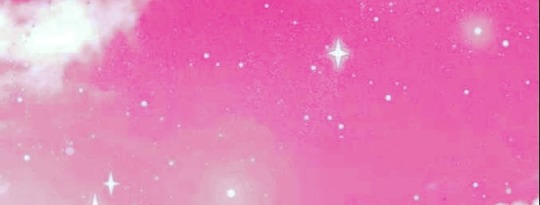
Yan Chrollo x GN Reader.
Synopsis: Chrollo is many things; annoying, chatty, selfish, petty. Especially petty.
Warnings: Yandere themes and kidnapping.
Word Count: 700.
“Petty, much?”
The damn devil doesn’t even turn to look at you. Instead, he turns to the next chapter of his book, a book large enough to easily force you or any other ordinary person into a yearlong coma if it hits your head. His humming physically hurts your ears and almost makes their drums burst, you are sure of it. You would much rather listen to his trill sonata from a gramophone and disc that is at least five times your age.
You cannot find the stuffed animal you normally sleep with. You have been looking all day while this clone of the antichrist just sits and reads in whatever the hell that language on the dusty cover is. You wouldn’t be surprised if he had made it himself, it’s only further proof that he is just an old man on the inside. Or at least half; the other part may as well be a toddler throwing a tantrum.
Maybe less than half, now that you think about it. That plush was a gift from Chrollo to you, after all, a symbol of how adorable you are or something else in that vein that made his face all the more punchable. The bunny made for a good pillow and could be used as a sort of wall whenever the epitome of hell lays on the bed beside you, trying to converse or cuddle with you.
It certainly yielded better results than biting, kicking, and hitting him at least. Your knuckles and palms still sometimes hurt. Ow. His flesh is made of iron, you know it. Maybe you should dare him to get his DNA tested to ensure that he is indeed human before speaking with you again.
You could fake an allergic reaction to automatons perhaps. Even though you were never a drama kid in school you think you can still pull it off.
You can craft yourself an Emmy using what remains of your old art supplies, though that would require having Chrollo cut the papers and cardboard for you. You bet that if he is a robot, he will eventually use up all his battery by chatting away and then shutting down.
“What are you, a kindergartener?” You move closer to his unholy throne, stomping with each step forward. “Stop acting like you are eight, you swindler, and give it back.”
It would be easier that way if he went unconscious because of his powerless charge.
If you are feeling particularly sadistic you could use electric shocks on his unconscious tin can of a body until it explodes. It would be a great thing, the sound. Like fireworks, if you avoid getting stabbed by tiny slabs of hot metal.
“Kindergarteners are ages five to six.” You could picture dreaming of it now if you can go to sleep tonight. “Eight-year-olds are typically in the grades second and third.”
“So you do admit to stealing it, then. This trial has now concluded, you have been sentenced to life without parole.”
You can hear a slight chuckle that makes you want to fall down the stairs while playing jump rope. Anything to make sure you never hear it again. “You get points for effort, darling. That wasn’t a confession, I was just correcting your utterly adorable libel.”
“Don’t talk like that to your judge, you larcenist.”
“I see you have been reading the books I have given you.”
You grumble a curse under your breath as you walk a bit closer. “It is amazing what the human mind can remember from a dictionary when there is nothing better to do. I think if I ever see my literary teacher again she’d be impressed. I’d pass with flying colors if I ever had to retake her class.”
At the sight of your laid-out hand, a slight frown appears on Chrollo’s face. “Being polite never hurt anyone, you know.”
You scoff and cross your arms, not looking at him anymore. “It hurts me every time I say anything to you instead of trying to find out how to give you enough papercuts to make you internally bleed.”
Underneath the table, you can see the rabbit plush, and crouch down to grab it.
“Take this as an act of precaution then; don’t test my limits, dear.” As soon as you look into his eyes, hugging the stuffed animal, you look away as you see what lies beneath the surface once more.
Nothing.
#yandere chrollo#yandere chrollo x reader#yandere hxh#yandere hunter x hunter#yandere chrollo lucilfer#yandere#chrollo x reader#chrollo lucilfer#hxh chrollo#phantom troupe#chrollo hunter x hunter#yandere x reader#yandere hxh x reader#hxh#ideas#author aya
225 notes
·
View notes
Note
Something I've been chewing on that I do wonder if you have any thoughts on.
What is the intended characterization/symbolism of Yang's semblance. Jaune is a healer/support. Ren learned to control his emotions and then grew empathetic. Qrow has his bad luck which is probably a defense mechanism with consequences from the bandits that raised him and Raven.
Taiyang's description of Yang's semblance is the closest to an analysis the audience has gotten and that is - "basically a Temper Tantrum". Very interestingly the narrative has so far let that description stand uncontested. And I believe you were the one that did the analysis that Yang's problem was overly depending upon her semblance as a finisher.
Also fun to consider how one of the ways that Yang has her parallel with Cinder is with the fire association... which for Yang is just actually her preferred ammunition and the go to imagery for her songs that I can recall off the top of my head except for temper metaphors.
that was me yeah
a core theme of yang’s character is that she’s made of contradictions and cannot be easily defined or fit into a single box. this is true of every character in rwby—there’s always more than meets the eye, complexity beneath the surface—but yang as a character is subject to other characters’ struggle to parse who she is. tai sees a temper tantrum, ruby sees invulnerability, blake has been on an emotional journey spanning six volumes of just learning to see and love yang’s whole, complete self. yang is raven’s daughter, after all—but she’s also summer’s daughter so much that the resemblance screams itself out of the screen.
so. her semblance.
in the story, it’s been described three different times by three different characters:
ruby: “every hit makes her stronger, and she uses that to fight back. that’s what makes her special”
tai: “basically a temper tantrum, great in a bind, but it won’t always save you”
blake: “his semblance is like yours, he absorbs energy through his sword, stores it up and sends it back when he’s ready” (+ yang feeling it’s “cheap” that he “gets to dish out damage without feeling it”)
<- three bears.
in goldilocks terms, yang’s semblance is “too strong” (ruby sees her as invulnerable), “too weak” (tai sees the power it grants her as essentially hollow, false) and “just right” (yang is neither invulnerable nor fragile and her semblance is just a part of her). i also think that what yang says of adam’s semblance is more revealing of her own self-perception than necessarily being meant as an objective critique of adam—it’s not “cheap” to parry/riposte and in fact yang’s growth as a combatant post-beacon looks like learning to fight more defensively and evasively, less reliant on soaking up damage/power for explosive finishers.
insofar as there’s a meaningful difference between adam needing to block hits vs yang not it’s that yang’s semblance gives her a bit of a cushion—she can still riposte even if she misses the parry—and in all honesty i think probably comes down to their kit. yang is a hand-to-hand fighter. she’s blocking hits with her forearms and, gauntlets or not, she’s going to feel that. the specific damage-absorption mechanics of their semblances cater to their fighting styles.
but, yang feels that it’s “cheap” for adam to absorb energy through his sword rather than his own body, because yang takes a certain pride in being able to get back up after being knocked down. her idea that she must take damage before she can deal it back twice as hard is probably not a real, immutable characteristic of her semblance but something that developed in response to how yang herself copes with trauma—it’s a way of, i think, regaining a sense of control and security by telling herself that it’s okay if bad things happen because it will just make her stronger in the end.
the narrative challenges this way of thinking post-beacon—losing her arm and being left behind did not make yang stronger, receiving support from trusted adults like oobleck and port and reuniting with her friends/family is what made her stronger. learning to accept help and treat herself with more compassion is making her stronger. exploring who she is apart from ruby is making her stronger. this is the direction she’s growing in emotionally—that being hurt doesn’t make her strong, healing makes her strong—and her use of her semblance is shifting in tandem with that (still pops it as a finisher quite often but it is pretty rare since v6 that yang uses it to gain the upper hand in fights she’s at risk of losing, bc these days she’s more focused on evasion/outmaneuvering opponents to create openings for her semblance to end the fight)
and then it’s connected to yang’s anger (and fear, as when she gets between neo and ruby) because both the feelings and the semblance are in essence a self-protective response—yang gets angry when she or someone she cares about is hurt and uses that anger to protect herself and/or the person she loves. her semblance is about taking painful things that happen to her and transmuting that into the power to defend herself. same thing.
i don’t actually think that her semblance is hooked into her anger in the, like, mechanical sense (we’ve definitely seen her pop the semblance in context where she’s having a GREAT time, for one)—the correlation arises from yang’s anger being motivated by protectiveness and a desire to not be hurt, which is also what manifests in her semblance.
i would argue that “basically a temper tantrum” is meant to be read in context with ruby’s “that’s what makes her special” and then both those extremes are brought to a resolution by blake’s neutral description of what burn is, mechanically; in that sense i don’t think that tai’s analysis has been left uncontested except insofar as yang didn’t argue with him—but conversely, tai more or less tells her to think of her semblance as a risky weapon of last resort and yang went “k” and started using her semblance more, so i think it’s less that yang takes his advice at face value than it is yang recognizing that tai raises a generally good point [being creative and flexible is valuable] and thinking okay, i can probably get more out of my semblance if i try new things.
her position is that burn is normal (“how is me using my semblance different from someone else using theirs?”), and the way she takes this advice on board reflects that—if someone else relied on their semblance for just one specific tactic and nothing else, what advice would they be getting from their instructors? push yourself further, test the limits of what you think you can do, get out of your comfort zone. that’s what winter tells weiss when she’s struggling! that’s how RNJR are taught in v5! tai views burn as fundamentally different from other semblances, and his advice really comes down to “don’t rely on it, you don’t need it.” but yang disregards that part of what he tells her entirely. she quietly sorts through what tai tells her and only keeps what she thinks will actually help her improve—which is, in itself, of a piece with her semblance. she takes the ‘hit’—the harsh and rather unfair criticism—and then filters/converts it into something more constructive.
(there is also some interesting subtext here with the protective/self-protective drive behind both yang’s anger and her semblance and tai’s perception that the semblance is a “temper tantrum”—which aside from framing burn itself as abnormal also casts yang’s anger as irrational, childish, out-of-control. given the dynamic of yang’s childhood situation, the parentification and leaving yang and ruby alone at home for extended periods of time and over-identification of yang with raven plus favoritism toward ruby… and factoring in tai referring to yang’s anxiety and post-traumatic depression as “moping” well. across the board he seems either unwilling or unable to seriously/genuinely engage with yang’s feelings so how much of his perception that yang has “temper tantrums” follows from outbursts she had when overwhelmed as a child or young teen that tai didn’t take seriously or chose to ignore rather than deal with the root cause of neglect/trauma?)
96 notes
·
View notes
Text
Talent and Overblots: An Interesting Relationship
So I read an analysis about Leona and his overblot and it has gotten me to thinking and, only just realizing that talent is a bit of a theme for Twisted Wonderland. Or rather, talent in a more negative lighting than it is often portrayed in.
Simply put, everyone who has overblotted is also talented and said talents (+ the side effects of being talented) really seem to be a large part of their trauma, stress, and varying issues that culminate in their overblot. I’m going to put the rest of the analysis under the cut for fear of any spoilers and due to length (and it is long), but this is something that is incredibly fascinating to me since this portrayal of talent is so wildly different from what is typically seen.
Starting with Overblot #1, Riddle is obviously talented. He became a housewarden in his first year, has an incredibly powerful signature spell, knows all the rules of Heartslabyul, and is a top student in a school filled to the brim with geniuses. We know from his overblot backstory that his mom held him to strict rules and pushed him too far, always demanding he be better than the best. Talented wasn’t enough. He had to be perfect. And that is, quite simply, what led to his overblot. He was holding others to that same horrifying strict regime. Talent isn’t enough, you must be perfect. But Riddle’s talent(s) is what made this drive for perfection truly frightening. That talent of his is what helped to lead to the pedestal that he (and others) placed himself on. And then his view was an incredibly simplistic, and even relatable one. If I can do it, so can they. But that viewpoint is what led to him pushing too far and breaking down when he realized exactly what he’d done. Ace quite possibly put it best when he informed Riddle that he was, “An extension of her”. Her, being Riddle’s mother. Realizing that he’d become that same tyrant, constantly pushing that talent wasn’t enough and you had to be perfect, was a big part of Riddle’s overblot. Because what is worse than becoming the very thing you’ve feared and toiled under since you were a child?
Leona is obviously talented. He is one of NRC’s geniuses, implied to be a very physically strong beastman, possesses an incredibly powerful signature spell, and has the cleverness to think his way out of any situation on top of the fact that he can power his way out of most problems due to his incredible persistence. But those talents were little more than weights around his neck when nothing he did mattered. He would never be king no matter what he did. But how much of Leona’s overblot was ever really being about king, when the crown that just the image that stuck with him? After all, the crown was the first thing that he was probably told he could never have no matter how talented he was. So kingship became a symbol of all he can never succeed in, despite his many talents. In the Savannaclaw chapter, story vignettes, and even in events people are constantly telling Leona that if he just tried he could do it. He is talented after all. And how much must that sting? You’re talented, and you have tried, but no matter what anyone tells you, it doesn’t seem to matter. The words of encouragement others give him are just like a slap in the face because failure keeps rearing its head. Thoughts like that can easily lead to or worsen depression and self-loathing. Especially when he gets his hope up once more that maybe he can do something, he keeps getting dragged back down, either by life’s machinations or his own occasionally self-destructive behavior. As a culmination of this, we find Leona exactly where he was in the Savannaclaw chapter. Failing once more and finally breaking apart as it occurs in front of those who have placed him as their head, the leader of their Pride. Not only has he failed himself, he has failed those who place their faith in him. To Leona, it no doubt looked like his greatest fears were true. Even with all of those talents, Leona feels worthless because he can’t succeed even once.
Azul is talented even if he himself doesn’t see it. Not many can say they have a successful restaurant business, and have hoodooed both the headmage and a good number of one’s fellow students at his age. Azul’s talent isn’t the one he wants though. He wants something more flashy and easily seen. Something that will make others not bother him. He never wants to be a silly little octotwerp who gets made fun of again. And, at this point, Azul can’t seem to see his knack for business for what it is. A talent. Being surrounded by so many obvious talents at NRC is bound to crush him, because everywhere he looks there is someone better than him in some way. So Azul gets greedy. He won’t let them make fun of him and look down on him like his previous classmates did. He can’t take that again. But then all of his carefully calculated actions come crashing down around him. Leona destroys his contracts and asserts, no less, that Azul has been beaten by a magicless prefect. And that is when Azul truly starts to crumble to pieces. He can’t even beat someone that he no doubt viewed, at that point, as a nobody. His actions turn desperate as he fears that Jade and Floyd, the two who’d actually taken a look at young Azul and saw talent there, are abandoning him because he’s been beaten at his own game. In Azul’s eyes, he has no talents, so why would they stay? All those feelings come racing back and Azul really does feel like a nobody. Just a silly little octotwerp even despite all his efforts. And so he overblots. Because obviously if you aren’t talented, then no one wants you and it doesn’t matter.
Jamil is talented in numerous ways and, unlike Azul, he knows it. But Jamil’s talents consistently get ignored or downplayed by everyone, even his own family. And it’s all because of the fact he works under another family so in the eyes of those around him, Jamil can’t and shouldn’t be better than Kalim. So he blames Kalim, even though he knows it isn’t Kalim’s fault that they were born in the positions they are in. Even though Kalim is someone who has always lavished praise on Jamil’s talents and never downplayed them. Even though Kalim is his friend. It’s too much. Because each time Kalim, the source of Jamil’s woe (at least in his eyes), praises him, it’s like a slap in the face. A reminder that even though you’re talented, you aren’t allowed to reach the full height of your abilities. All because of this fellow, who is your friend and greatest supporter. When Jamil’s grand scheme is foiled, it breaks him. It’s a hard hit to his ego and probably feels like yet another reminder that he can’t outdo Kalim. And, to top it all off, there’s the guilt. Because like it or not, Jamil knows it’s not Kalim’s fault because Kalim, for all that he doesn’t understand or realize about their situation, would never put Jamil in the situation that he has found himself in. And so Jamil overblots. His talents don’t matter because he isn’t allowed to show them. He’s restrained, and all of that frustration is suddenly coming out.
Next is Vil, whose troubles are so curiously (and perhaps amusingly) similar to Leona’s. Because for all of Vil’s talent as an actor, he can’t get the role he so desperately longs for. To be the hero, standing on stage till the very end where people will notice him. But it is Vil’s talent (and beauty) that weighs him down and makes people speak of how special he is. And isn’t special so similar to being unrelatable? So talented is he, so special is he, so unrelatable is he, that he must be the villain. Because no one wants a hero that seems so otherworldly, perfectly beautiful and talented. No, they want a hero they understand. A more relatable type of attractiveness, a more mundane level of skill. A villain is, as Vil’s dad asserts in the overblot flashback, a hard role to play. But Vil knows that it’s also the role everyone hates. No one wants to be the bad guy. And how often do people actually pay attention to the villain? Everyone’s eyes are on the star of the show, the good guy. Getting typecast because of his talents is a big part of what leads to Vil’s overblot. He is so weighed down by how inescapable the role of villain seems that he quite literally becomes a villain. And, mirroring Riddle, the realization that he has become that thing he so loathes and maybe even fears is what causes his overblot. The golden child that he was has finally fallen and become mired in the hideous filth that remains when one’s talent becomes a set of shackles that makes you ‘special.’
Idia is, like the others, talented. But interestingly he seems to loathe his talent just as much as he loathes a crowd. Despite his amazing technological achievements, Idia doesn’t want the recognition of fame that comes from his talents. In many ways, he almost behaves like he wants to be free of his talents. As if that talent is a chain. And perhaps it is, that talent makes him well-suited to the position he was born into is yet another chain that binds him to the Island of Woe. His wishes don’t matter. Idia is doomed to his position by both his family name and his talents. The stress of such a truth paired his past with Ortho’s death, and the constant reminder that he is at fault for it (or so he constantly tells himself) is what causes his overblot. Because at least this way, maybe Idia can use his talents once more to do something he wants. To save his brother, and atone for what he has done.
Finally, there is Malleus. Another individual with undeniable talent. Someone who is already listed amongst the most powerful of magicians and who comes from a long line of talented people. But Malleus’s talent, skill, and power for magic is what causes others to fear him, worship him, and avoid him. No one wishes to approach someone so fearsome and talented, because how could they? He is a royal who seems so far beyond them, they cannot comprehend such talent and power. Surely he is beyond them. And when they can’t understand him, perhaps it is better to fear him. It’s only natural to fear that which we can’t understand, so that is what happens to Malleus and his incomprehensible power. The isolation that stems from other’s fear and misunderstandings leads Malleus to do what is only natural. To cling to those few people that remain near him. Those who don’t fear him and instead accept him. And that isolation, paired with the need to cling onto those precious few while all others continue to stare at him in awed horror, is what contributes so greatly to his overblot. Because if those few leave him, what does he have left in his ivory tower of talent?
Anyway, I just find it fascinating that Twisted Wonderland has portrayed the darker side of talent and how it can lead to so many issues for those that hold it. Talent is a blessing in many ways, but there are two sides to every coin and it appears that talent can just as easily be a curse in the wrong situation.
#Twisted wonderland#overblot analysis#mywritings#Disney tw#twst#Riddle rosehearts#riddle rosehearts analysis#leona kingscholar#leona kingscholar analysis#Azul ashengrotto#Azul ashengrotto analysis#Jamil viper#Jamil viper analysis#Vil schoenheit#Vil schoenheit analysis#Idia shroud#Idia shroud analysis#Malleus Draconia#Malleus draconia analysis#twisted wonderland analysis#theory??#long#really long#analysis#disney#twst analysis#overblot#Talents
179 notes
·
View notes
Video
youtube
“The Color of Corruption - How Purple Is Used”
What I find interesting about this (”this” being how the color of “Purple” is tied to corruption in storytelling, meaning dark magic, malevolence etc.) and how it relates to Donnie and the themes of his character.
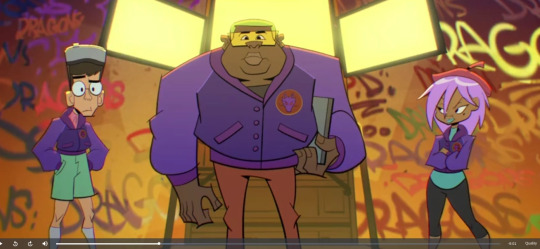
(”Purple Dragons” have been called so in the original TMNT Mirage Comics, even before Donnie became “The Purple Brother”. “Purple” just being associated with “evil”.)
Do you notice something about RISE Villains?


Even most shots of the Krang are more purple than they are pink.

But the Color Purple symbolizes not just “villainy”.
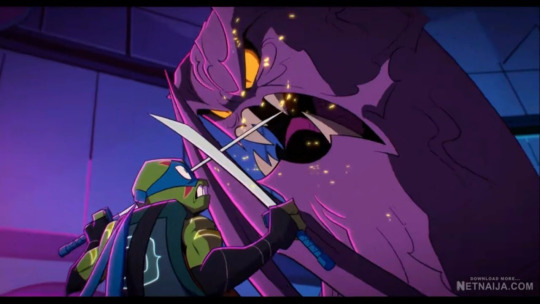
Psychologically speaking, since purple is a rare color in nature its abundance means that something unnatural is happening. Its abundance feels threatening because “it gives the distinct sense of not belonging.” (Razbuten 2020)
But obviously, Donnie is not an evil character.

His “malevolent” tendencies are never executed.
Yes, he traqulized both Mikey and Raph, (which was inredibly irresponsible) but he did that in situations where they were surrounded by family and would be cared for by everyone present.
Yes, he made a shock-collar for Leo and Leo got hurt, but Donnie also made the collar in a way that Leo could take it off again without Donnie’s help. It’s the difference between getting your head dunked in a toilet and getting waterboarded.
He says he wants to go “semi-lethal” on his father, but he asks for permission. He could’ve just fired. But all it takes for him to stop is Leo telling him “No.”
Out of all of them, Donnie has the weakest moral compass. But he cares deeply enough about his brothers, that it doesn’t impact his place in the story.
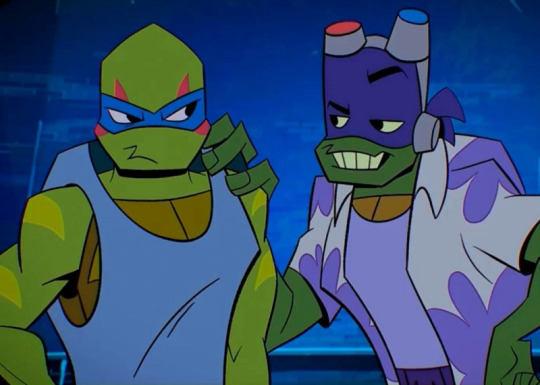
Looking at it through that lens, Leo is more responsible that Donnie. I’ve noticed a trend with Leo being the one to “not let Donnie shine” the most. (I’m like, 99% sure Donnie would’ve already killed a man without him around.) And April as well!
(Whenever Raph’s stopping Donnie it seems mostly for trying to keep Donnie out of harm’s way. Mikey tries to prevent emotional harm to and from Donnie, e.g. Shelldon’s restraining bolt.)
Without his family, Donnie might be...
well.

(Donnie says “I’m sorry” more often than Leo during the series by the way, always towards or because of his family.)
What I love about this is this:
Donnie claims to “never let things go” and Leo seems also able to hold a grudge for a while, but they forgive each other pretty easily. (All the brothers do.)
To close it out: Yeah, Donnie is “the purple brother” and thematically he wears it well. He has the weakest morals, is incredibly destructive (emotionally as well as physically) but he does love his family above everything and his destructiveness is the strongest when it comes to protect them.

(I love how, despite his manic rage here... purple is also a soft color.)
(They really love each other, hehe.)

#rottmnt#rottmnt donnie#rottmnt analysis#rise of the tmnt#rottmnt leo#rottmnt movie#tmnt donnie#tmnt#rottmnt donatello#rottmnt leonardo#not me writing about purple instead of my college project#ah welp#I'll be more productive tomorrow#<3
252 notes
·
View notes
Text
Why Don’t We Love The New Polyamory Flag?
I’m going to keep this brief because no one needs a lecture.
It was claimed that “polyamorous people voted” and this was “the word of the community” and yet no one seemed to know this vote existed or was taking place?
In the argument of “well this one is better on the eyes” there have already been designs keeping the original themes that solve that issue.
It removes some of the history attached to the original flag, history that no one seems to care about anymore. Even if you think that the pi symbol is stupid, there have been versions made with the infinity heart, a universally recognized symbol of polyamory.
The flag is very hard to recreate in many designs. As someone who makes pride bracelets, it’s very easy to recognize the blue, red, and black. This flag is harder to recreate.
It’s been said that the colors are easily mixed up with the bisexual flag or the androgynous flag, and removes that iconic individuality that the polyam flag colors have.
This isn’t me saying it’s ugly or that criticisms of the original flag aren’t valid. I’m not here to point fingers and say that it’s “problematic” and that “we need to stop using it”. I’m not even here to cry about how annoying it is that everyone calls the original flag ugly when someone of us actually like it and how tiring that negativity gets to be to hear a piece of art you like trashed. I’m simply here to say that this is NOT the new universal flag, and according to a poll *I* put out on tumblr, 60% of people reject the new flag. What you have is two camps of people, one camp that voted this new flag into existence as the majority of people in some mysterious poll and those who support this decision, and another group that has worked to keep the original flag in tact and/or has an issue with the unconventional design of the new one. At least here on tumblr you’ll find a lot of the big polyamory blogs like @polyamorouscultureis @polyamoryfacts @polyamorousmood @polyshipprompts @polyamory4life @polyamory-ponderings @polyamory-place @polyamory-imagines and so many more still using some version of the original flag. It’s not going anywhere, and I wish people would stop acting like we all threw it in the garbage.
237 notes
·
View notes
Text
Astolfo and revenge
(Something I posted on twitter, that I'll add a bit to)
I don't think the message of Astolfo's story is "vengeance only does more harm than good". It's pointed out multiple times in the manga that vengeance/hatred is what keeps him going.
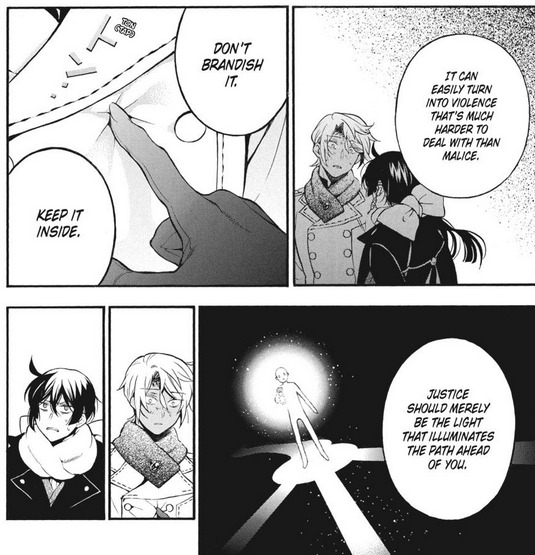

Hell, Astolfo is morally opposed to murder, he KNOWS. I genuinely believe he still doesn't want to kill, and only kills because he is stuck in a cycle, realizes this, and is trying to keep others out of it.
"Revenge/murder is bad" it not the lesson he has to learn. I have the theory that his story is about how people keep up discrimination so they can benefit from it.
(1) His family was "an active player in the war against vampires", and I get the feeling that's why the Granatum house is so wealthy. I mean, they had strong ties to the Church, while regularly holding the seat of Garnet. Of course Astolfo's father told him to kill vampires, he needs to be the Garnet Paladin so the family keeps its wealth and status! There's the implication in the manga that the Granatum family (and the Obsidian house) have their status thanks to their participation in the war. Once an institution benefits from something, it won't easily let go of that, no matter how morally apprehensive it is.
(2) Charles wants to make Astolfo the Garnet Paladin so he can become a symbol for the Chasseurs (or at least the vampire eradication faction, and like I said, killing vampires is what gave these people power, so it is very possible the vampire eradication faction is a reflection of that). Charles is building a narrative: "Astolfo Granatum's family was injustly killed by vampires, now he kills to avenge them, therefore he is justified to kill vampires". The weapon of the Garnet Paladin is named "Pillar of Justice". That Astolfo fights for justice is part of the whole act!
(3) I really think Astolfo kept resisting against his fate of "killing vampires". His father gives him the knife and he gets scared, Charles tells him to pick up Louisette and he gets scared...

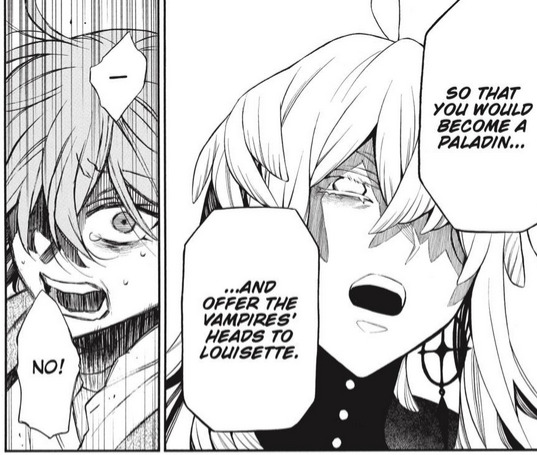
In the end, he gives up. His self-hatred, carefully upheld by Charles, is too strong. He has no other options left, especially when Roland leaves him! This proves to me that he only "takes revenge" because he felt like there was nothing else for him left. I really want to emphasize the "he gave up his struggle" here.
So, I came to a conclusion that surprised me at first! "Hatred isn't automatically bad, preying on that hatred to push an agenda is bad". Astolfo is a victim of the institution he works for. That is the message, I believe.
I think that theme will be addressed in the current dham arc as well. So far it seems it's building towards it, with the whole scene of Vanitas explaining to Noé how discrimination works.
68 notes
·
View notes